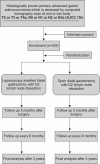Laparoscopy Assisted versus Open Distal Gastrectomy with D2 Lymph Node Dissection for Advanced Gastric Cancer: Design and Rationale of a Phase II Randomized Controlled Multicenter Trial (COACT 1001)
- PMID: 24156036
- PMCID: PMC3804675
- DOI: 10.5230/jgc.2013.13.3.164
Laparoscopy Assisted versus Open Distal Gastrectomy with D2 Lymph Node Dissection for Advanced Gastric Cancer: Design and Rationale of a Phase II Randomized Controlled Multicenter Trial (COACT 1001)
Abstract
Purpose: Laparoscopy-assisted distal gastrectomy for early gastric cancer has gained acceptance and popularity worldwide. However, laparoscopy-assisted distal gastrectomy for advanced gastric cancer is still controversial. Therefore, we propose this prospective randomized controlled multi-center trial in order to evaluate the safety and feasibility of laparoscopy assisted D2-gastrectomy for advanced stage gastric cancer.
Materials and methods: Patients undergoing distal gastrectomy for advanced gastric cancer staged cT2/3/4 cN0/1/2/3a cM0 by endoscopy and computed tomography are eligible for enrollment after giving their informed consent. Patients will be randomized either to laparoscopy-assisted distal gastrectomy or open distal gastrectomy. Sample size calculation revealed that 102 patients are to be included per treatment arm. The primary endpoint is the non-compliance rate of D2 dissection; relevant secondary endpoints are three-year disease free survival, surgical and postoperative complications, hospital stay and unanimity rate of D2 dissection evaluated by reviewing the intraoperative video documentation.
Discussion: Oncologic safety is the major concern regarding laparoscopy-assisted distal gastrectomy for advanced gastric cancer. Therefore, the non-compliance rate of clearing the N2 area was chosen as the most important parameter for the technical feasibility of the laparoscopic procedure. Furthermore, surgical quality will be carefully reviewed, that is, three independent experts will review the video records and score with a check list. For a long-term result, disease free survival is considered a secondary endpoint for this trial. This study will offer promising evidence of the feasibility and safety of Laparoscopy-assisted distal gastrectomy for advanced gastric cancer.
Trial registration: NCT01088204 (international), NCCCTS-09-448 (Korea).
Keywords: Gastrectomy; Lymph node excision; Stomach neoplasms.
Figures
References
-
- The Information Committee of the Korean Gastric Cancer Association. 2004 Nationwide gastric cancer report in Korea. J Korean Gastric Cancer Assoc. 2007;7:47–54.
-
- Kim HH, Kim KH, Kim DH, Kim C, Kim BS, Kim YW, et al. Nationwide survey of laparoscopic gastric surgery in Korea, 2004. J Korean Gastric Cancer Assoc. 2005;5:295–303.
-
- Lee JH, Han HS, Lee JH. A prospective randomized study comparing open vs laparoscopy-assisted distal gastrectomy in early gastric cancer: early results. Surg Endosc. 2005;19:168–173. - PubMed
-
- Hayashi H, Ochiai T, Shimada H, Gunji Y. Prospective randomized study of open versus laparoscopy-assisted distal gastrectomy with extraperigastric lymph node dissection for early gastric cancer. Surg Endosc. 2005;19:1172–1176. - PubMed
Associated data
LinkOut - more resources
Full Text Sources
Other Literature Sources
Medical


